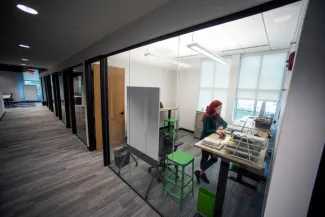
Think you'll work past 70? Good luck. Why most of us retire earlier.
We’re living healthier, longer. Many of us have jobs we can do on a computer from our couch. If we want to keep working past 70, or even past 80, what’s to stop us?
A lot, as it turns out.
The average American retires not at 80, or 70, or even 65, but at 62. That statistic comes from two different annual surveys of working and retired Americans, one from the Employee Benefit Research Institute (EBRI), and the other from the Transamerica Center for Retirement Studies. Sixty-two is a point in life that many of us would term middle age: hardly a moment to hang it all up. Medicare doesn’t kick in until 65. Average life expectancy is 77.5. Our sitting president is 81. Few of us plan to retire at 62. The average over-50 worker expects to retire at 67, according to the Transamerica study. Two-thirds of older employees plan to retire after 65, or not to retire at all.
Want to work till 70?
The hard truth: We don’t always get to retire when we want. The reality of retirement in America is a “radical departure” from what workers envision, Transamerica reports.
Many people imagine easing out of employment on their own terms. But actual retirement tends to arrive abruptly and unexpectedly, triggered by declining health or corporate downsizing. The new year has brought a cascade of layoff announcements from big companies like Amazon, Citigroup, and Google. “Often, it does appear that it’s out of their hands,” said Catherine Collinson, CEO of the Transamerica Center, a research nonprofit.
In the Transamerica survey, 56% of retirees said they retired sooner than they had planned. A much smaller share, 7%, retired later than expected. Only 37% retired on their own schedule.
Why do so many people retire earlier than planned?
Why do so many of us retire sooner than we had hoped?
Simply put: Life happens.
In the Transamerica report, nearly half of those who retired earlier than planned blamed their health: physical limitations, illness or disability. Roughly two-fifths blamed their jobs: They were laid off, downsized or lured into early retirement, or they were no longer happy at work. “You see it now, with a lot of companies laying people off,” said Howard Hook, a certified financial planner in Princeton, New Jersey. “Are a lot of those people going back to work? Some may; some may not.” The Transamerica survey, conducted by The Harris Poll in December 2022, covered 2,546 workers ages 50 and over, and 2,104 retirees. The EBRI survey, conducted in January and February of 2023, covered 1,320 workers and 1,217 retirees.
Collinson said the Transamerica findings mirror those of prior surveys.
“We’ve seen this in our work for years,” she said. “We ask retirees why they retired sooner than planned and, by and large, it’s due to either personal health issues or employment-related issues. They may get laid off, bought out, reorganized, and it’s extremely difficult for older workers to find work.” Younger workers “tend to be more optimistic about their ability to retire at 65 or sooner,” not because they have to, but by choice, Collinson said. “And then, as people get closer and closer to retirement, the realities set in, and then we see increasing numbers expecting to work longer and retire at a later age.”
Transamerica found a five-year gap, 67 vs. 62, between when older workers expected to retire and when retirees actually retired.
3 lessons
Takeaway 1: It’s never too early to start planning for retirement. Studies repeatedly show many Americans lack both retirement plans and retirement savings.
Takeaway 2: When you sit down to write a retirement plan, err on the conservative side. Don’t assume you’ll work into your 80s.
“Set a date that you want to retire, and then maybe take three years off of it, and that should be where you should shoot for,” Copeland said. "Let’s say you hope to retire at 70. Make a retirement plan that assumes you retire at 67. Once you reach that age, Copeland said, “if you still have your job, you still have your health, everything past that should be gravy.”
Takeaway 3: Don’t get too caught up in the numbers.
We’ve already seen that we may not get to choose when we retire. It’s also hard to project how much money we’ll save by then, given the imponderables of investing. Instead, experts say, focus on broad retirement goals: Save for retirement from an early age. Take full advantage of an employer’s 401 (k) match. Save more aggressively once you reach midlife. Pay down debt.
The hard truth is that life can throw curveballs, making it crucial to start planning for retirement early. When crafting a retirement plan, it is important to consider various life events that may happen and prepare for the unexpected. At Blackbridge Financial, we are happy to assist you in finding the best strategy to achieve your financial goals. Schedule a meeting with us to see how we can help you create the best retirement plan and secure your financial stability!
To read the full article, follow this link.

